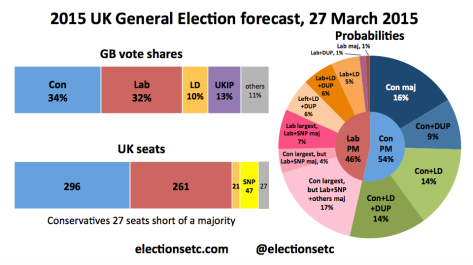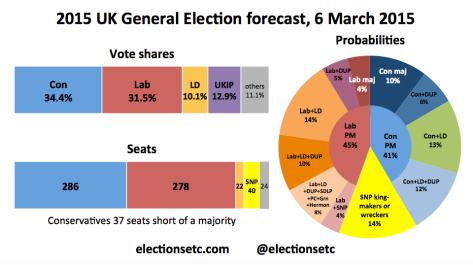Monthly Archives: March 2015
Forecast update: 20 March 2015
Liberal Democrats after the election: a left of centre party which should be able to work more easily with Labour than the Conservatives
by Stephen Fisher and Eilidh Macfarlane
At the 2010 election Liberal Democrat MPs, members and voters were all more social liberal than economic liberal (using both terms in their traditional British not American sense) i.e. left rather than right of centre. But their leaders, especially Nick Clegg, Danny Alexander and David Laws are further to the right than most of their party. In his book 5 Days in May, Andrew Adonis goes so far as to argue that the Liberal Democrats formed a coalition with the Conservatives rather than Labour not because of the parliamentary arithmetic was considerably better but instead because Nick Clegg and David Laws especially were ideologically closer and personally warmer to the Tories than to Labour. Continue reading Liberal Democrats after the election: a left of centre party which should be able to work more easily with Labour than the Conservatives
Salutary lessons from the Israeli election polls 2015
by Stephen Fisher
Publishing polls in the last five days before an election is illegal in Israel, so the final pre-election polls were published on 13th March. They suggested that Binyamin Netanyahu’s Likud party would get around 22 seats to 25 for the Zionist Union (the alliance between Labor and Haunuah, led by Issac Herzog and Tzipi Livni).
The exit polls yesterday suggested 27 each.
The actual result was 30 for Likud and 24 for the Zionist Union. Continue reading Salutary lessons from the Israeli election polls 2015
The public-private electoral divide
by Stephen Fisher
Janan Ganesh in today’s FT is right to point to trends in public sector employment as an import factor in understanding the political future of Britain. He notes that, “The public sector headcount has fallen by about 1m since the last election to 5.4m, which is where it was before Labour’s expansion commenced in 2000. […] Meanwhile, private-sector employment has risen and the self-employed account for a record 15 per cent of the labour force. The confluence of fiscal policy and economic trends is creating a looser, more individualised economy. This does not guarantee that the electorate will become less receptive to collectivist ideas, but it requires no feat of imagination to see how it might.”
As well as the electorate as a whole becoming less collectivist with a smaller state there is also a more simple mechanism at play. For obvious reasons, private sector workers have long been more likely to vote Conservative and public sector workers more Labour. The more of the former and the fewer there are of the latter the easier it will be for the Tories to win elections. Continue reading The public-private electoral divide




